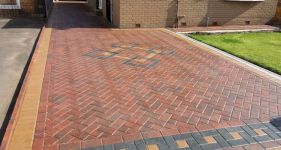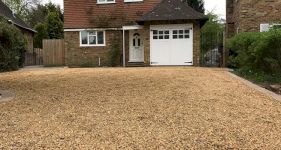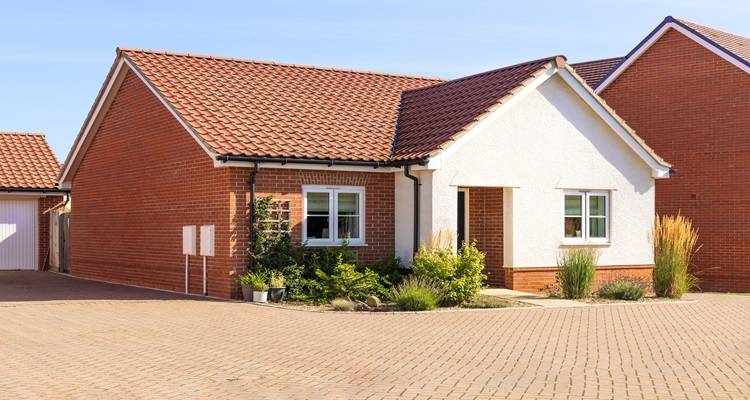Gravel Driveway Guide
Are you thinking about installing a gravel driveway at your home?
If you are looking for information about installing a gravel driveway, then look no further, as this guide will tell you everything you need to know.

Table of Contents
- What is a Gravel Driveway?
- Types of Gravel
- Gravel Driveway ideas
- What Are the Pros and Cons of a Gravel Driveway?
- How Much Does a Gravel Driveway Cost?
- How to Install a Gravel Driveway
- How Long Does It Take to Install Gravel on a Driveway?
- Building Regulations or Planning Permission Approval for a Gravel Driveway
- How to Clean and Maintain a Gravel Driveway
- Alternatives to a Gravel Driveway
- Questions to Ask When Hiring a Gravel Driveway Installer
- FAQs
- Sources
What is a Gravel Driveway?
Gravel is defined as any loose rock or stone larger than a grain of sand but smaller than a cobble. Gravel pieces usually range from around one-tenth of an inch to around two and a half inches.

Gravel can be used to create a simple but effective driveway. Creating a gravel driveway usually involves digging out driveway foundations and then pouring gravel into the foundations and levelling it out. This creates a neat surface that can accommodate parked cars.
Types of Gravel
There are multiple different driveway gravel types that you can choose from for a gravel driveway. Below is a list of the most common gravel types for driveways and some information on each type:
Pea Gravel
A pea gravel driveway is a very popular type of gravel driveway. The stones are small in size, round in appearance, and have a smooth surface.
This type of gravel features a range of colours, and you will likely see flecks of green, blue, red, black, brown, and white. The colour and texture of this type of gravel make it very aesthetically pleasing.
PROS
✔ Popular variety
✔ Easy to walk on
✔ Nice range of colours
✔ Aesthetically pleasing
CONS
✖ Not for everyone
River Rock
River rock gravel contains a diverse collection of rocks that have been worn and rounded by moving water. The stones come in a variety of colours, sizes, and textures.
The surface of these rocks is very smooth due to the moving water. River rocks can be quite expensive, depending on the season and the availability in your area.
PROS
✔ Variety of colours
✔ Variety of sizes
✔ Variety of textures
✔ Smooth texture
CONS
✖ It can be quite expensive
✖ Not always available
Crushed Stone
Crushed stone is created by mechanically crushing natural quarried stone. This type of gravel can come in several colours depending on the type of stone that it’s manufactured from.

Some stone types inhabit a range of colours which can be very aesthetically pleasing on a driveway. Crushed stones usually come in grey, white, blue, and red colours. They are usually angular in shape, which means that they hold together well. The pieces sit together well and don’t tend to shift much under the weight of a vehicle, making them perfect for a driveway.
PROS
✔ Don’t shift much
✔ Hold together well
✔ Range of colours
CONS
✖ Some pieces can be sharp
✖ Not to everyone’s taste
Gravel Driveway ideas
Gravel driveways look great on their own, however, if you are looking to make your gravel driveway appear a bit more unique, there are many different things you can do. Below is a list of gravel driveway ideas to help you jazz up your driveway:
Add Colour to Your Gravel
It’s easy to add a bit of extra colour to your driveway. Simply add some overhanging shrubs or plants along the edge of your driveway to make it look a little brighter. Another advantage of this is that it removes the need for edging at the sides of your driveway.
Create a Rounded Driveway
If the space you have is large enough, you could create a rounded driveway with a centrepiece. This is a driveway that looks a little bit like a roundabout and has a central feature. This type of driveway will only really work if you have a large space available for landscaping.
Gravel with Block Paving
You can make your ordinary gravel appear much more exciting by incorporating block paving alongside it. You could create a driveway that is half block paving and half gravel. Alternatively, you can create block paving borders around the gravel driveway for a unique look.
Patterned Gravel
You can create patterns in your gravel by incorporating different colours and separating different areas. This allows you to create a unique pattern that you won’t find anywhere else.
What Are the Pros and Cons of a Gravel Driveway?
If you are considering getting a gravel driveway, you may be curious about the advantages and disadvantages that come with one. Below is a list of the main pros and cons of choosing a gravel driveway:
PROS
- Budget-Friendly – A gravel driveway is a great cheap option when compared to many other types of driveway. It’s especially cost-effective if you are covering a large area of land.
- Long-Lasting – A well-installed and cared for gravel driveway can last for many years.
- Easy-to-Maintain – A gravel driveway doesn’t require much maintenance. Removing weeds occasionally and refreshing the top level of gravel every few years is enough to keep it looking perfect.
- Good drainage – Gravel is permeable, which means water can’t stagnate and ruin the driveway.
- Quick to Install – Laying a gravel driveway can be quite a fast process, especially when compared to other driveway installations.
CONS
- Weed Growth – Weeds can easily grow through gravel, so it’s important to keep on top of weed control with this type of driveway.
- Hole Development – Over time and as you use your driveway, it may start to develop holes, and these will need to be filled in.
- Limited Styles and Colours – Although you can get different colours and sizes of gravel, you are much more limited in what you can get when compared to some other driveway types.
- Can be Dusty – Gravel driveways can produce a lot of dust, which can transfer onto your car.
- Not Great in Winter – Snow and ice are very difficult to remove from a gravel driveway.
How Much Does a Gravel Driveway Cost?
If you are considering getting a gravel driveway installed, then you may be wondering how much you can expect the job to cost.
The average cost of your gravel driveway will depend on several factors, including the size of your driveway, the type of gravel used, and your location in the UK. Those based in the London area can expect to pay more for their gravel driveway installation than those based in the North or other parts of the UK.
A small driveway of around 20 square metres would cost around £1700, and a large driveway of around 80 square metres would cost around £3700. These prices include the cost of materials and labour.

There are also some additional costs that you may wish to consider alongside your gravel driveway installation, such as a new driveway gate which costs around £500-£1000 on average, depending on the size and type of gate.
You may also want to consider a brick wall installation to close off your driveway, which costs around £600-£1200.
How to Install a Gravel Driveway
A gravel driveway is one of the simplest driveway types to install. Below is a step-by-step guide on how to build a gravel driveway:
- Before laying your driveway, you will need to prepare the area. This may involve removing your old driveway or removing turf, debris, or topsoil.
- Next, you will need to dig out the area. This should be to a depth of around 50mm-200mm. The level you dig to will depend on whether you are installing a sub-base.
- Ensure that the area is completely compacted.
- It is recommended that you install an aggregate underneath your gravel layer to ensure that the area remains stable and doesn’t sink when used. This will act as your sub-base. Make sure this is compacted as much as possible.
- Next, add a weed prevention membrane layer over the top of the sub-base.
- Finally, shovel your chosen gravel onto the weed membrane. Make sure the gravel layer is at least 50mm thick and evenly spread. It helps if you use a rake to spread the gravel out evenly.
A gravel driveway is one of the simplest types of driveway to install and can be completed as a DIY job if you feel confident enough to do so. Many people prefer to go down the professional route and hire a company to install their gravel driveway for them.

Although this may cost a little bit more, it’s much more convenient, and you can be certain that you’ll be left with a fully working driveway that is finished to a high standard.
How Long Does It Take to Install Gravel on a Driveway?
When planning on having a new driveway installed, timescales are usually one of the biggest questions asked. Some driveway types can take weeks to prepare and install. Luckily, gravel driveways are quite simple to install, so won’t take as long.

The exact time it takes to have your new gravel driveway installed will depend on the size of the driveway, the ease of access, and how much landscaping is needed beforehand.
On average, it takes around 1-3 days to install a gravel driveway. Roughly one day for a small driveway, two days for a medium driveway, and three days for a large driveway.
Building Regulations or Planning Permission Approval for a Gravel Driveway
When it comes to a gravel driveway, you won’t need to worry about planning permission. The rules state that any new or replacement driveway of any size does not need planning permission as long as the surface is permeable and allows water to drain through, such as gravel.
If your property is a listed building or is in a conservation area, then you may need planning permission to make any changes to your home. It is advised that you contact your local authority before commencing with any work.

Building regulations don’t generally apply to driveway work. However, you will need to make sure that your new driveway doesn’t make any changes to the access to your property.
If you are unsure whether your new driveway or any alterations may need building regulations approval, then you should contact your local authority for advice.
How to Clean and Maintain a Gravel Driveway
A gravel driveway is quite easy to maintain in comparison to other driveway types. It doesn’t require any major cleaning and the maintenance is easy to keep on top of. Below is a list of things that you can do to maintain your gravel driveway:
Remove Debris
Whenever you see little bits of debris in your gravel, such as sticks or leaves, you should pick them out and dispose of them. The longer your leave debris to build up, the more difficult the task will be when you come to do it.
Fill in Holes or Ruts
Whenever a rut or hole appears in your gravel driveway, you should fill it in. Some homeowners will simply move some gravel from another area of the driveway and spread it into the hole.

However, this just causes more weak spots. Instead, you should fill the hole with new gravel. Gravel driveway repairs tend to be quite simple and should only require the addition of some new gravel.
Add Fresh Gravel
You should aim to add a fresh layer of gravel to your driveway every one to two years. This will keep the driveway looking fresh and will help to ensure it lasts for a very long time.
Use Edging Material
As your driveway is used, the gravel can move around, and some of it can end up in the grass or coming off the sides of the driveway in places where it shouldn’t.
The best way to ensure your gravel stays in place when you use it is to install gravel driveway edging, which will help contain all of the pieces of gravel.
Apply Weed Killer
Even if you use a weed membrane underneath your gravel, some stubborn weeds could still poke through. If this happens, you should apply some weed killer to them and pull them up.
If you’re worried about a lot of weeds coming through, it’s a good idea to apply weed killer to the area regularly to prevent it from becoming a big problem.
Alternatives to a Gravel Driveway
There are several alternatives if you decide a gravel driveway isn’t for you. Below is a list of the most common types of driveway in the UK and the pros and cons of each type:
Block Paving
Block paving is a very popular choice of driveway in the UK because there is a range of different blocks available, and you can create gorgeous patterns with an attractive finish.
The blocks can be laid in many styles, so it’s easy for homeowners to find an aesthetic that suits their home.
PROS
✔ Diverse styles
✔ Hard-wearing
✔ Aesthetically pleasing
CONS
✖ High costs
✖ Difficult to install
Resin
Resin driveways are becoming more and more popular in the UK. They provide an aesthetically pleasing finish and are known for being very durable. They are also quite quick to install and don’t require a lot of maintenance.

PROS
✔ Aesthetically pleasing
✔ Good drainage
✔ Diverse colours
✔ Not too expensive
✔ Fast installation
✔ Easy to maintain
CONS
✖ Hard to find experienced installers
Concrete
Concrete is a very popular driveway material in the UK. It is extremely durable and easy to maintain. There are several colour options available so you can easily create a driveway that fits in with the theme of your home.
PROS
✔ Easy to maintain
✔ Good temperature control
✔ Aesthetically pleasing
✔ Many colours available
CONS
✖ Could crack over time
✖ It can be quite expensive
✖ Surface stains can be a problem
Asphalt
Asphalt is another popular type of driveway in the UK. It is durable, aesthetically pleasing, and lasts for a very long time, making it a great investment.
However, it can be quite expensive to install, so not a great option if you’re on a tight budget.
PROS
✔ It lasts a very long time
✔ Very durable
✔ Aesthetically pleasing
CONS
✖ Requires some maintenance
✖ It can be expensive to install
✖ Falls victim to some weather damage
Questions to Ask When Hiring a Gravel Driveway Installer
There are several things you may need to consider when finding the right contractor to install a gravel driveway at your home.
Below is a list of common questions that you should ask when looking for the right contractor for the job:
- Does the contractor have any qualifications that relate directly to installing a gravel driveway?
- What equipment will the contractor be using to complete the job? Will they be using the correct type of equipment? Do you need to provide any equipment?
- Does the contractor possess any form of insurance for the work? You should look for contractors who have insurance that covers property damage, personal injuries, and a work guarantee.
- How much experience does the contractor have in gravel driveway installation? Can they provide any testimonials or evidence of previous work? Can they provide photos of previous work?
- Does the contractor offer any guarantees with their work? How long does the guarantee last? What issues are covered under guarantee? Will the contractor fix any issues that arise?
- How long will the work take to complete?
- How many contractors will be working on the job?
- Is there anything you need to do to prepare for the installation?
FAQs
Can you restore a gravel driveway?
- Even out the surface of the driveway and smooth it out.
- Apply sand or a sub-base to fill out the gaps and create an even smoother surface.
- Apply a new top layer of gravel and smooth out the surface.
Can you install a gravel driveway on top of grass?
When it comes to a gravel driveway, it’s always best to have a strong sub-base underneath the gravel, and grass simply won’t provide a stable enough surface.
Can I install a gravel driveway myself?
It’s important to keep in mind, however, that it is quite a hefty task as it involves excavation and shovelling gravel.
It may also take you longer to install a gravel driveway than it would if you were to hire a professional company to do it for you.
Can I park my car on a gravel driveway?
Over time, this may lead to some holes or thinned out areas that could ruin the aesthetic of your driveway.
How much gravel do I need?
If you are looking to purchase the gravel yourself beforehand, however, you may need to know roughly how much is needed.
A good rule of thumb when it comes to knowing the right amount is that a tonne of gravel should cover around 25 square metres of the driveway. This means that one tonne of gravel is enough to cover a small driveway.
Sources
https://bmmagazine.co.uk/business/6-best-types-of-gravel-for-driveways-that-you-must-know-before-making-it
https://www.drivewaywise.com/best-gravel-driveway-ideas
https://www.premiersurfacing.co.uk/hints-tips/pros-cons-gravel-driveway
https://decorativeaggregates.com/blog/how-to-lay-and-maintain-a-gravel-driveway-in-7-simple-steps
https://www.planningportal.co.uk/info/200130/common_projects/45/paving_your_front_garden
https://braenstone.com/gravel-driveway-maintenance
https://flexflooring.co.uk/driveway-options
https://www.machinefinder.com/ww/en-US/faq/how-to-restore-gravel-driveway








